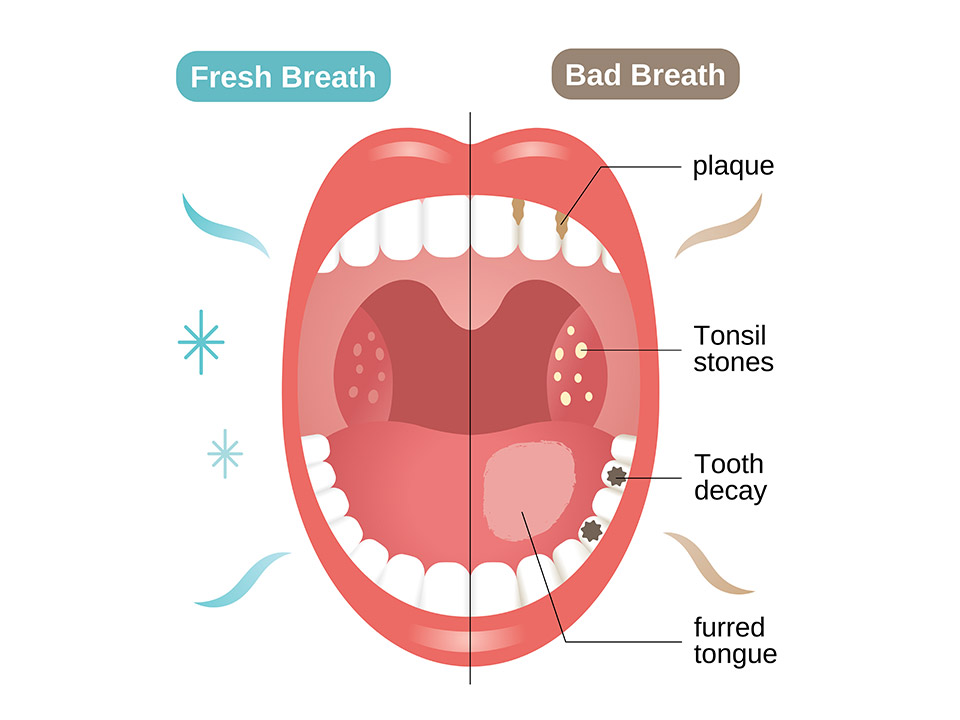Have you found yellow or white lumps coming out from the back of your mouth? These are commonly known as tonsil stones.
Tonsil stones are more common than people realize. They are often associated with bad breath and, other times, swollen or inflamed tonsils.
It is rare for tonsil stones to cause considerable harm to your health. However, in some cases, large tonsil stones can lead to complications. In addition, the stones can also be an indication of a throat infection.
What Are Tonsil Stones?
Also known as tonsilloliths, tonsil stones are hard white or yellow debris that forms around the back of your throat. The stones primarily appear in the folds and gaps of your tonsillar crypts within the tonsils.
In most cases, tonsil stones are painless, and you can quickly deal with them in the comfort of your home. However, in other complicated situations, you will need medical intervention.
What Are Tonsils?
Tonsils are a set of small tissues located at the back of your throat. These oval-shaped glands are part of the lymphatic system that helps protect your body from infections.
The organs have gaps, folds, and crevices called tonsillar crypts responsible for holding bacteria and food particles in your mouth. They do this by filtering viruses and bacteria.
What Causes Tonsil Stones?
When bacteria, fungi, and viruses get filtered, they get trapped between the food material in the tonsillar crypts. After a while, the material hardens and calcifies, leading to the formation of tonsil stones.
What Are The Symptoms Of Tonsil Stones?
Bad breath
One of the most common symptoms of tonsil stones is halitosis or bad breath. This is caused by the bacteria breaking down food particles in your mouth, producing a bad odor.
Severe bad breath is something to worry about. It means that your tonsils have an infection that you should clear immediately. Contact your dentist if you have any concerns about halitosis.
Coughing
Secondly, tonsil stones are notorious for causing throat irritation. The irritation can cause discomfort that you can only relieve when coughing.
Sore throat
If you are unlucky enough to develop tonsil stones and tonsillitis, you will develop a sore throat. Pain and irritation to your throat are caused by inflammation and infection. The infection causes complications to your oral and overall health without proper treatment.
White or yellow debris
Tonsil stones are white or yellow. Looking keenly at the back of your throat, you might notice the small solid lumps trapped between your tonsil tube or crypts.
Trouble swallowing
Depending on the size and location of the tonsil stones, you will experience difficulty when swallowing food or drinks.
Swollen tonsils
Hardening of the debris and material can lead to other tonsil complications. Bacteria in the stones trigger inflammation and infections in your tonsils, causing them to swell.
Ear pain
As tonsil stones develop around the tonsils, they can put immense pressure on the shared nerve pathways around your mouth and ear. This can cause pain and irritation to your ears without the stone leaving your tonsils.
How Can You Diagnose Tonsil Stones?
Your doctor is the only person who can accurately diagnose tonsil stones. The dentist will check your tonsil folds for any hidden debris during your examination.
Furthermore, the doctor can perform imaging tests to locate any hidden material or check for any infections caused by the stones.
How To Remove Tonsil Stone At Home
If you have a problem with tonsil stones, you can try a few remedies at home to relieve your irritation. Here are some tips for stone removal.
Saltwater
Gargling warm salt water is one of the most common ways to dislodge tonsil stones. The water also helps flush out bacteria from your tonsils.
All you need to do is dissolve half a teaspoon of salt into a glass of water and gargle vigorously, easing discomfort and irritation.
Vinegar
Vinegar is also another good remedy for tonsil stone removal. The acidic property of apple cider vinegar breaks down the debris for easier dislodging. Add a teaspoon of vinegar into a glass of water and gargle.
Essential oils
Some essential oils have antibacterial and anti-inflammatory properties that help reduce the formation of tonsil material.
Thieves, myrrh, and lemongrass oil can be diluted into a carrier oil like coconut oil and used during oil pulling. Likewise, you can add a little of the solution to your toothbrush before brushing.
A cotton swabs
You can also use a soft cotton swab to press gently on your tonsil to dislodge the stones. However, you must be cautious as aggressively rubbing the tonsils can cause a tear to the folds or even an infection.
Only try this if the stone is small and easy to reach. Immediately after removing the tonsil stones, you should always gargle warm salt water.
If you struggle to reach the tonsil stones, do not attempt further; instead, book an appointment with your doctor.
Coughing
Coughing is another ideal way to remove your tonsil stones. However, this depends on the size and location of the lump.
Garlic and Onions
Garlic and onion are excellent foods to snack on if you are trying to clean your mouth. They have antibacterial and anti-inflammatory properties that prevent bacteria growth in the mouth.
Tonsil Stone Treatment and Removal
During a tonsillectomy, a surgeon will remove your tonsils, thus resolving long-term tonsil stone problems.
Your doctor may alternatively recommend surgical removal of large tonsil stones. This is ideal for the prevention of further complications.
Finally, your doctor can prescribe antibiotics to prevent bacteria growth and reduce the risk of tonsil infections.
Tonsil Stone Prevention
Good dental hygiene is often the solution to preventing tonsil stones. Brushing and flossing your teeth will remove bacteria and food material stuck in your tonsils. Also, gargle water after every meal to dislodge food that might build up in the crypts.
Book an appointment with All About Smile Dental Group. Our dentists are always ready to help with information about dental health or how to better care for your teeth.







